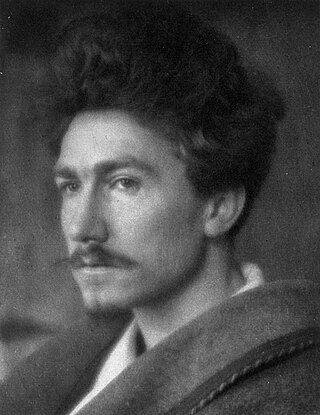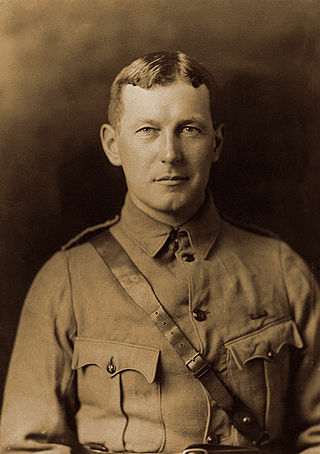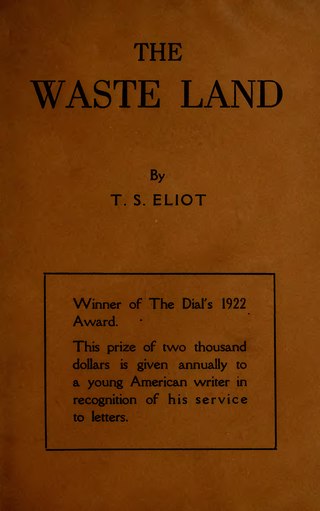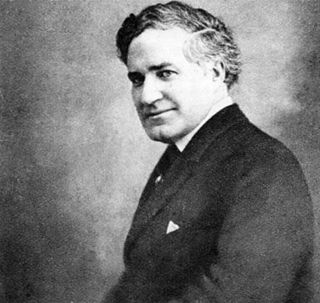Related Research Articles

Thomas Stearns Eliot was a poet, essayist, publisher, playwright, literary critic and editor. Considered one of the 20th century's major poets, he is a central figure in English-language Modernist poetry.

Ezra Weston Loomis Pound was an expatriate American poet and critic, a major figure in the early modernist poetry movement, and a fascist collaborator in Italy during World War II. His works include Ripostes (1912), Hugh Selwyn Mauberley (1920), and his 800-page epic poem, The Cantos (c. 1917–1962).

Richard Aldington, born Edward Godfree Aldington, was an English writer and poet, and an early associate of the Imagist movement. He was married to the poet Hilda Doolittle from 1911 to 1938. His 50-year writing career covered poetry, novels, criticism and biography. He edited The Egoist, a literary journal, and wrote for The Times Literary Supplement, Vogue, The Criterion and Poetry. His biography of Wellington (1946) won him the James Tait Black Memorial Prize. His contacts included writers T. S. Eliot, D. H. Lawrence, Ezra Pound, W. B. Yeats, Lawrence Durrell, C. P. Snow, and others. He championed Hilda Doolittle as the major poetic voice of the Imagist movement and helped her work gain international notice.

Imagism was a movement in early-20th-century Anglo-American poetry that favored precision of imagery and clear, sharp language. It is considered to be the first organized modernist literary movement in the English language. Imagism is sometimes viewed as "a succession of creative moments" rather than a continuous or sustained period of development. The French academic René Taupin remarked that "it is more accurate to consider Imagism not as a doctrine, nor even as a poetic school, but as the association of a few poets who were for a certain time in agreement on a small number of important principles".
Modernist poetry in English started in the early years of the 20th century with the appearance of the Imagists. In common with many other modernists, these poets wrote in reaction to the perceived excesses of Victorian poetry, with its emphasis on traditional formalism and ornate diction. In many respects, their criticism echoes what William Wordsworth wrote in Preface to Lyrical Ballads to instigate the Romantic movement in British poetry over a century earlier, criticising the gauche and pompous school which then pervaded, and seeking to bring poetry to the layman.

"The Love Song of J. Alfred Prufrock", commonly known as "Prufrock", is the first professionally published poem by American-born British poet T. S. Eliot (1888–1965). Eliot began writing "Prufrock" in February 1910, and it was first published in the June 1915 issue of Poetry: A Magazine of Verse at the instigation of Ezra Pound (1885–1972). It was later printed as part of a twelve-poem pamphlet titled Prufrock and Other Observations in 1917. At the time of its publication, Prufrock was considered outlandish, but is now seen as heralding a paradigmatic cultural shift from late 19th-century Romantic verse and Georgian lyrics to Modernism.
The Objectivist poets were a loose-knit group of second-generation Modernists who emerged in the 1930s. They were mainly American and were influenced by, among others, Ezra Pound and William Carlos Williams. The basic tenets of objectivist poetics as defined by Louis Zukofsky were to treat the poem as an object, and to emphasize sincerity, intelligence, and the poet's ability to look clearly at the world. While the name of the group is similar to Ayn Rand's school of philosophy, the two movements are not affiliated.
"Gerontion" is a poem by T. S. Eliot that was first published in 1920 in Ara Vos Prec and Poems. The title is Greek for "little old man," and the poem is a dramatic monologue relating the opinions and impressions of an elderly man, which describes Europe after World War I through the eyes of a man who has lived most of his life in the 19th century. Two years after it was published, Eliot considered including the poem as a preface to The Waste Land, but was talked out of this by Ezra Pound. Along with "The Love Song of J. Alfred Prufrock" and The Waste Land, and other works published by Eliot in the early part of his career, '"Gerontion" discusses themes of religion, sexuality, and other general topics of modernist poetry.

Thomas Ernest Hulme was an English critic and poet who, through his writings on art, literature and politics, had a notable influence upon modernism. He was an aesthetic philosopher and the 'father of imagism'.
Frank Stuart Flint was an English poet and translator who was a prominent member of the Imagist group. Ford Madox Ford called him "one of the greatest men and one of the beautiful spirits of the country".

The Cantos by Ezra Pound is a long, incomplete poem in 120 sections, each of which is a canto. Most of it was written between 1915 and 1962, although much of the early work was abandoned and the early cantos, as finally published, date from 1922 onwards. It is a book-length work, widely considered to present formidable difficulties to the reader. Strong claims have been made for it as the most significant work of modernist poetry of the twentieth century. As in Pound's prose writing, the themes of economics, governance and culture are integral to its content.
Hugh Selwyn Mauberley (1920) is a long poem by Ezra Pound. It has been regarded as a turning point in Pound's career, and its completion was swiftly followed by his departure from England. The name "Selwyn" might have been an homage to Rhymers' Club member Selwyn Image. The name and personality of the titular subject are also reminiscent of T. S. Eliot's main character in "The Love Song of J. Alfred Prufrock".

Nationality words link to articles with information on the nation's poetry or literature.
Nationality words link to articles with information on the nation's poetry or literature.

The Waste Land is a poem by T. S. Eliot, widely regarded as one of the most important poems of the 20th century and a central work of modernist poetry. Published in 1922, the 434-line poem first appeared in the United Kingdom in the October issue of Eliot's The Criterion and in the United States in the November issue of The Dial. It was published in book form in December 1922. Among its famous phrases are "April is the cruellest month", "I will show you fear in a handful of dust", and the Sanskrit mantra "Shantih shantih shantih".

A Lume Spento is a 1908 poetry collection by Ezra Pound. Self-published in Venice, it was his first collection.

Cathay (1915) is a collection of classical Chinese poetry translated into English by modernist poet Ezra Pound based on Ernest Fenollosa's notes that came into Pound's possession in 1913. At first Pound used the notes to translate Noh plays and then to translate Chinese poetry to English, despite a complete lack of knowledge of the Chinese language. The volume's 15 poems are seen less as strict translations and more as new pieces in their own right; and, in his bold translations of works from a language he was unfamiliar with, Pound set the stage for modernist translations.

The Spirit of Romance is a 1910 book of literary criticism by the poet Ezra Pound. It is based on lectures he delivered at the Regent Street Polytechnic in London between 1908 and 1909 and deals with a variety of European literatures. As with Pound's later, unfinished poem The Cantos, the book follows "a pattern, at once historical and atemporal, of cultural beginnings and rebeginnings".

Herman George Scheffauer was a German-American poet, architect, writer, dramatist, journalist, and translator.
References
- ↑ The Last Temptation Reconsidered by Carol Iannone, from First Things 60, February 1996
- 1 2 A Guide to Ezra Pound's Personae: 1926 by K. K. Ruthven, University of California Press, 1969]
- ↑ Ezra Pound: poet. A Portrait of the Man & His Work. Volume 1: The young genius, 1885-1920, by Anthony David Moody, Oxford University Press, 2007
- ↑ Ezra Pound: His Metric and Poetry by T. S. Eliot, (New York: Alfred Knopf, 1917)
- ↑ The Work of Ezra Pound by Carl Sandburg, originally published in Poetry , February 1916
- ↑ The Poetry of Ambrose Bierce by Jack Matthews, originally published in slightly different form in the Ohio Review, fall 1997